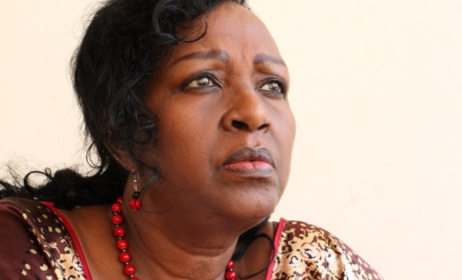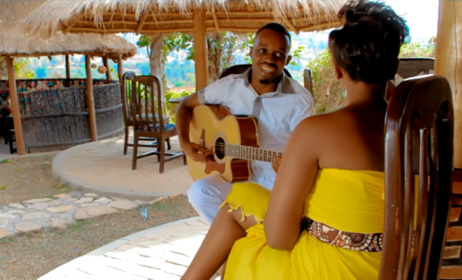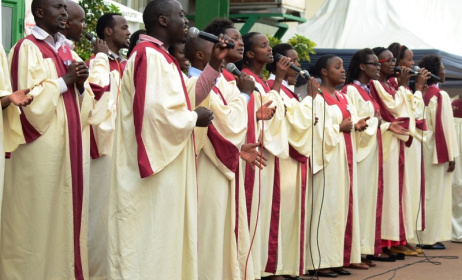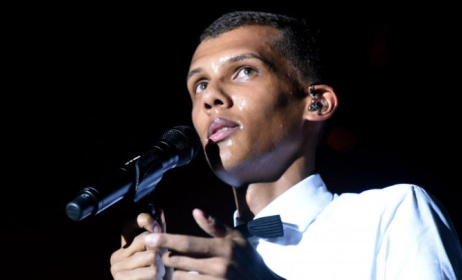Rwandan music in exile
By Julius Bizimungu
Music has always played an important role in the civil, economic and social life of Rwanda. Throughout the genocide in 1994 it became a tool for propaganda, with the songs of artists working on behalf of the government helping to encourage the killings.
 Exiled Rwandan singer Cecile Kayirebwa. Photo: www.igihe.com
Exiled Rwandan singer Cecile Kayirebwa. Photo: www.igihe.com
Not enough has been written about Rwanda's music industry after the 1994 genocide, even though the effects of the genocide on the country's music industry cannot go unnoticed. Many of the country's artists (like their fellow citizens) sought refuge in other countries. Today, over two decades later, most of them are finding their way back to Rwanda to help rebuild the country's music sector. This text provides an overview of the influence on the local music industry of the genocide, the resulting exile of Rwandan artists and their more recent return to the country.
Music's role in the 1994 genocide
While Simon Bikindi was once Rwanda's most famous musician, he is also one of the country's most famous accused war criminals. At the time of the genocide in 1994, Bikindi was a well-known composer and singer of popular music, as well as the director of the performance group Irindiro Ballet. Bikindi’s songs, which called for Hutu solidarity against Tutsis, were broadcast repeatedly before and during the genocide by Radio Télévision Libre des Mille Collines (RTLM)[i]. He was arrested in July 2001 at a centre for asylum seekers in The Netherlands for inciting violence through his songs during Rwanda’s 1994 genocide. Following his trial between 2006 and 2008, the International Criminal Tribunal for Rwanda (ICTR) became the first war crimes tribunal to indict a musician for incitement to genocide.
Bikindi's songs were described as having elliptical lyrics and catchy tunes, mixing English, French and Kinyarwanda and combining rap-style lyrics with traditional folk song melodies. The two songs mentioned in Bikindi's indictment, songs for which he stood accused of inciting genocide, were 'Twasezereye ingoma ya cyami' (we said goodbye to the feudal regime) and 'Njyewe nanga Abahutu' ('I Hate Hutus') [ii],. At the beginning of the orgy of killing that engulfed Rwanda from April to July 1994, Bikindi wasn't even in the country. He is said to have been in Europe, arranging a tour for his ballet troupe. In December 2008, Bikindi was sentenced to 15 years in prison.
The return of exiled artists
Mighty Popo (real name Jacques Murigande) is hugely influential in Rwanda and beyond. Born to Rwandan parents, he began life as a refugee in Burundi before immigrating to Canada, where he established himself on the blues scene. He returned to Rwanda in 2012 and is the founder of the KigaliUp! Music festival. He is also involved in the setting up of the government’s first ever music school, which aims to improve the music industry in Rwanda.
“My love for Rwanda is unconditional,” says Mighty Popo. "It’s in my blood and the sweat of people who liberated the country from bloodthirsty wolves that were devouring it with impunity at that time. I told myself it was my duty to participate in the welfare of my fellow citizens in however small a way. When you don’t do something for your country, then you don’t love your country."
Singer Cecile Kayirebwa is a Rwandan traditional artist based in Belgium.Her father comes from a long line of artists, dancers, poets, storytellers and singers. Her first song to be broadcast on national radio in Rwanda was ‘Muvandimwe wacu Yuriyana tugusezeho’ (we say goodbye to you our relative Yuriyana), when she was just 17 years old. Determined to find the origins of Rwandan music and to share it worldwide, she went on to compose many songs, among them a praise song for Rwandan Queen Rosali Gicanda, who was killed along with members of her family during the genocide in 1994. One of her most popular song was 'Ibihangange', which literally means the ‘giants’.
In 1998 Kayirebwa participated in the first edition of the pan-African dance festival FESPAD in Kigali. In 1999 she performed at an event on Robben Island in Cape Town, South Africa. In 2001 she was part of a Holocaust memorial event in London. Around this time she released her debut album, Rwanda Rugali. In 2002 she released her second album, Amahoro and toured the USA and Canada. In 2005 she put out another CD, Ibihozo. In 2005 Kayirebwa's haunting vocals contributed to the soundtrack of the film Shooting Dogs, set during the Rwandan genocide. In 2016 Kayirebwa released a new album, Urukumbuzi. With this album, Kayirebwa continues her crusade to protect Rwanda’s traditional music and reaffirms the importance of passing it on this cultural heritage to new generations. “I don’t want to pass away without working with the young people, this would really be so bad," she said. "I want to at least work with young Rwandans who are passionate about art, so that I share and pass on the cultural heritage.”
Another pioneer of Rwandan music, Ben Ngabo (also known as Kipeti) was born in 1963 in Gahini. Today he is considered one of Rwanda’s most outstanding musicians, known especially for his skilful fusion of voice and percussion. He has played in several bands, including Melodica Band in Butare, Nyampinga, Malayika (during the 1980s), Inono Stars and finally Ingeli. Ngabo is well-known for hit songs like ‘Ingendo Y’abeza’, ‘Ryangombe, Nyirabisabo’, ’Umugenzi’ and ‘Sogokuru’, to name a few. His songs are entrenched in Rwanda’s musical traditions, re-interpreting traditional chants with the electric guitar. His incredible live performances have entertained Rwandans all over the country.
Ngabo recalls the moment when he was compelled to go abroad: “Following the 1994 Rwandan genocide, many artists were arrested. By the time most were released, they decided to flee the country for the sake of saving their lives. After my arrest I went to work in France when I left Rwanda." Since then he has toured all over Europe, America and Africa. “Music is something bigger and better," he says. "It has really taken me across the countries... Honestly, quitting music is like quitting part of your life. I even wonder how life could be without music. As Africans, it teaches a lot, and heals a lot in our lives,” says Ngabo of his work.
Ngabo decided to return to Rwanda to play a role in the development of the nation, particularly through empowering youth. “Though we spent long abroad, we never stopped thinking about our country. Personally, I used to visit the country several times, but I realized it would be useful for me to come back and help built my country,” he says. Ngabo is currently working at the Nyundo School of Music, where he shares his skills and experience with young people who are passionate about music.
“The passion for music made me who I am today," he adds. "Despite of the perils and challenges we passed through, we managed to keep up and never give up. I remember sometimes we regretted thinking that we didn’t choose the right way, but on the other hand we realized that the situation forced us to think that way.”
Conclusion
While freedom of expression is a human right, when it infringes on the well-being of others, musicians should be required to take responsibility for their music and the actions it inspires in others. As can be seen from Simon Bikindi's case, the artist often ends up as the loser, and the music industry at large suffers.
Although Rwanda's genocide had a disastrous impact on the country's msic industry, claiming the lives of many and forcing others into exile, the decision by some of Rwanda's leading artists to return and build the country's music industry is a welcome gesture. Hopefully the next generation of Rwandan artists will be able to learn from the past in order to create messages in their music that speak of national unity.
[i] https://en.wikipedia.org/wiki/Radio_T%C3%A9l%C3%A9vision_Libre_des_Mille_Collines [ii] http://www.nytimes.com/2002/03/17/magazine/killer-songs.html


























Comments
Log in or register to post comments